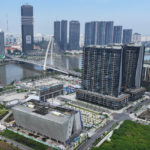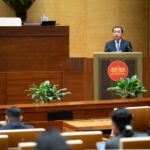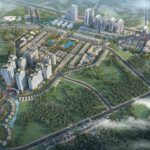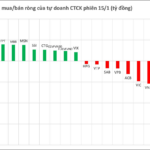On November 19th, the National Assembly held group discussions on the Draft Resolution, which outlines mechanisms and policies to address challenges in implementing the Land Law.
One key point of debate was the proposed provision allowing provincial People’s Councils to reclaim remaining land if 75% of the area and 75% of land users agree to transfer land use rights for socio-economic development projects of national or public interest.
Compensation Falls Short of Reality
Delegate Hoang Anh Cong (Thai Nguyen Province) highlighted the disparity in land compensation, noting that while the state compensates at VND 1 million/m², citizens must purchase land at up to VND 100 million/m², creating a glaring contradiction.
“Citizens aren’t opposed to socio-economic development or major projects, but current compensation and resettlement measures fail to meet practical needs. We must confront this reality to resolve these issues,” stated Delegate Cong.
He also questioned the 75% threshold for land area and user agreement, allowing the remaining 25% to be reclaimed. “While 24.9% may seem minor, its impact varies significantly depending on project scale—whether it’s 5,000 m² or 1,000 hectares, or involves a few households versus thousands,” he explained.
Delegate Cong warned that applying a uniform standard could resolve minor issues but would fall short for larger projects, potentially leading to increased complaints and disputes without detailed, case-specific calculations.

Delegate Hoang Anh Cong speaks at the group discussion. Photo: C.LUAN |
He likened the current provision to “tailoring a single garment for both a 100 kg and a 50 kg individual,” advocating for clear distinctions in cases and stricter conditions to prevent arbitrary application. Investors, he noted, could employ various strategies to achieve the 75% agreement threshold.
Delegate Cong also addressed instances where a few land users withhold agreement, sometimes demanding exorbitant prices. “If someone demands VND 1 billion/m², no investor could reasonably accept that,” he remarked.
Chief Justice of the Supreme People’s Court Nguyen Van Quang emphasized the need for careful consideration of the provision’s feasibility. “Land users typically agree to reclamation only after understanding the state’s compensation plan,” he observed.
Highly Appropriate, but…
Delegate Hoang Van Cuong (Hanoi) supported the provision, citing international practices where agreements lead to reclamation. “Vietnam’s development stage involves numerous large-scale projects, not individual reclamations. Halting projects due to a single disagreement among thousands of land users hinders progress and planning,” he argued.

Delegate Hoang Van Cuong supports the provision but stresses fair compensation for the 25% subject to compulsory acquisition. Photo: QH |
However, he noted that current regulations differentiate compensation for agreed versus reclaimed land, creating potential for disputes. He proposed applying the average agreed price—not less than the adjusted land price—to both the 75% and 25% groups to ensure fairness and minimize complaints.
For projects serving national defense, security, or public interests, he stressed the need for approved compensation and resettlement plans before reclamation. “The resolution requires 75% agreement on these plans before reclamation, which I support, but this 75% must specifically endorse the compensation and resettlement measures,” he clarified.
Delegate Do Duc Hong Ha (Hanoi) argued that the 75% threshold is too high, particularly for large projects affecting many households, potentially causing delays. He also criticized reclaiming land before approving compensation plans, which could provoke public discontent and disputes due to unclear rights protections.
He proposed reducing the threshold to 50% agreement, provided preliminary compensation and resettlement plans have been publicly consulted, except in cases where the Government reclaims land at provincial requests.
|
The State may reclaim land for socio-economic development of national or public interest in the following cases: a) Implementing free trade zone or international financial center projects. b) For projects where land use agreements have expired or extended deadlines have passed, and over 75% of the land area and users have agreed, provincial People’s Councils may reclaim the remaining land for allocation or lease to investors… (Excerpt from the Draft Resolution on Addressing Challenges in Land Law Implementation) |
REPORTING TEAM
– 12:47 19/11/2025
Supreme Court Chief Justice: Land Prices Must Align with Market Trends, Only Rising, Not Falling
Chief Justice of the Supreme People’s Court, Nguyen Van Quang, expressed concern that aligning land prices with market rates would inevitably lead to price increases, stating, “There’s no way to maintain or reduce them.”
Crafting Hyper-Localized Land Valuation Tables: A Thua-Level Approach
The draft resolution by the National Assembly outlines that land price tables will be structured based on land type, area, and location. For regions with digital cadastral maps and land price databases, pricing will be detailed down to individual land plots. Provincial People’s Councils will determine, publish, and implement these land price tables starting January 1, 2026, with provisions for amendments and updates as necessary.
Proposed Addition of Three Scenarios for State Land Reclamation
At the 10th session, the Government proposed to the National Assembly the addition of three scenarios where the State may reclaim land for socio-economic development in the interest of national and public welfare.


















